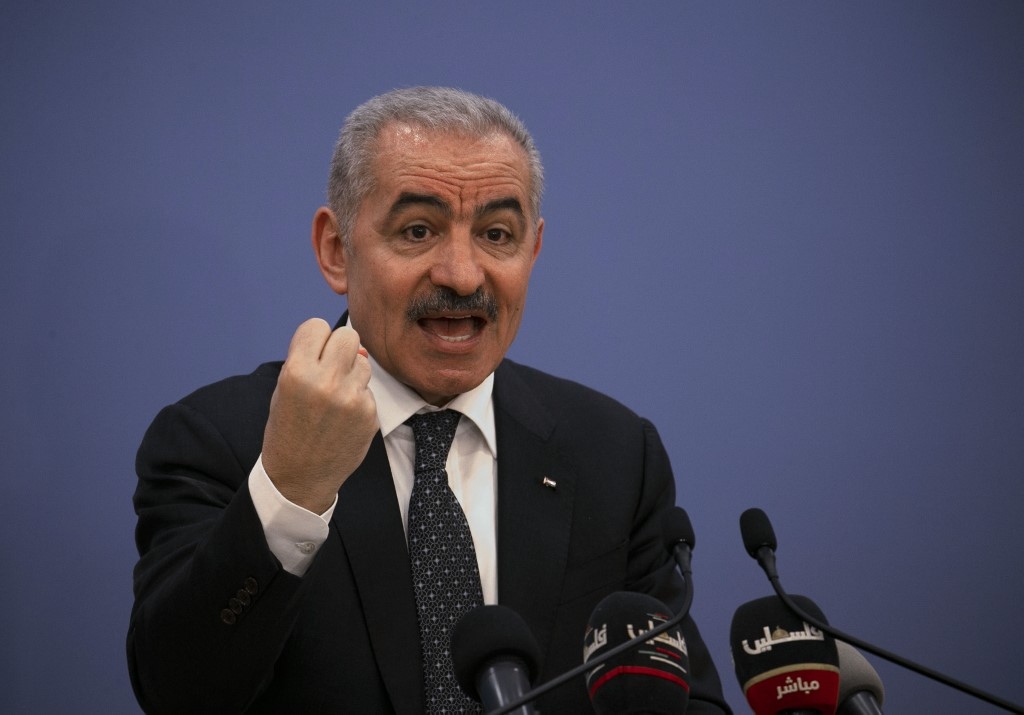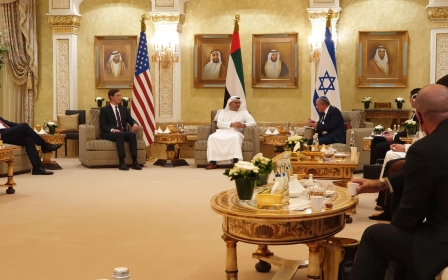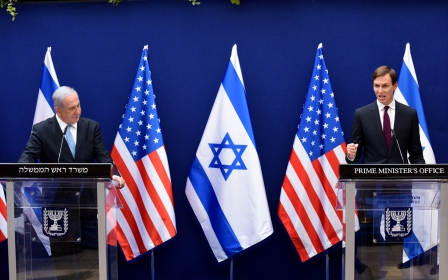Direct flight from UAE to Israel 'painful to watch', says Palestinian PM

Palestinian Prime Minister Mohammad Shtayyeh on Monday slammed the first-ever direct commercial passenger flight between Israel and the UAE as "very painful", after the El Al plane touched down in Abu Dhabi.
Speaking at a weekly Palestinian cabinet meeting held in Ramallah, the prime minister said the deal between the UAE and Israel to normalise ties was "a clear and a blatant violation of the Arab position towards the Arab-Israeli conflict".
The premier also noted the flight name, Kiryat Gat, is an Israeli settlement built on the town of Fallujah in occupied Palestinian territory.
"It is very painful for us today when an Israeli plane lands in the Emirates, under the flight name 'Kiryat Gat' - the settlement which was built on the occupied Palestinian lands of the town of Fallujah in which Gamal Abdel Nasser was trapped - in a clear and a blatant violation of the Arab position towards the Arab-Israeli conflict," Shtayyeh said, as reported by the Palestinian news agency WAFA.
"On this occasion, we salute the position of some Arab countries against normalisation with Israel, which made [Mike] Pompeo's tour fail to achieve its desired goals despite the pressures exerted on some Arab countries," he said.
"We had hoped to see an Emirati plane landing in liberated Jerusalem, but we live in a difficult Arab era."
The plane carried delegates from Israel and the United States, which brokered the deal, including Jared Kushner, a White House adviser and son-in-law of US President Donald Trump.
The joint delegation was welcomed on the tarmac by Emirati Minister of Foreign Affairs Anwar Gargash.
"While this peace was forged by its leaders, it is overwhelmingly desired by its people," Kushner claimed upon landing.
Officials are expected to explore bilateral cooperation in areas such as commerce and tourism on Monday.
'Stab in the back'
Hamas, the de facto ruling party in the besieged Gaza Strip, also condemned the UAE. The flight represented a "stab in the back of the Palestinian people, a prolonging of the occupation, and a betrayal of the resistance of the (Palestinian) people," the Palestinian movement said in a statement.
While the Emirates has stated that the deal was predicated on Israel freezing its plan to annex large swathes of the occupied West Bank, Israeli Prime Minister Benjamin Netanyahu has publicly said that annexation was still on the table.
The Trump administration unveiled its full proposal for Israeli-Palestinian peace in January - although it was denounced by Palestinians and a good part of the international community for presenting a very lopsided plan granting Israel the vast majority of its demands, while only allocating disconnected pieces of land for the establishment of a Palestinian state with no sovereignty over its borders or airspace.
Saudi Arabia, which does not have official diplomatic relations with Israel, gave permission for the Boeing 737 from the Israeli flag carrier to fly over its territory en route to the UAE's capital of Abu Dhabi, a source familiar with the flight plan said.
However, it skirted the Gulf states of Qatar and Bahrain, which have declined so far to follow the UAE's move.
Kushner acknowledged Riyadh's role in making the "historic" flight possible.
"This is the first time this has ever happened. I would like to thank the Kingdom of Saudi Arabia for making that possible," he said after landing.
Gulf Arab nations have had increasingly public ties with Israel in recent years, boosted by their shared rivalry with Iran and the advantages of linking their powerful economies.
But the UAE deal is the first Gulf country and only the third Arab state to establish formal ties with Israel. The other two Arab states, Egypt and Jordan, reached peace deals entailing the handover of land that Israel captured in the 1967 war.
While the Trump administration has repeatedly expressed its hopes that more Arab countries would come forward and normalise relations, Israeli officials have publicly mentioned Oman, Bahrain and Sudan as states likely to follow suit - although they have yet to do so.
Middle East Eye previously revealed that Saudi Arabia's Crown Prince Mohammed bin Salman had pulled out of a planned visit to Washington DC to meet Netanyahu after he feared that the news had leaked and that his presence in the US capital would become a "nightmare".
Sources told MEE that Trump and Kushner had been pushing for the meeting to happen in order to relaunch bin Salman's image as a young Arab peacemaker and shore up regional support for the deal between Israel and the UAE.
However, bin Salman's father, King Salman, has maintained the stance that any peace agreement with Israel was contingent on a deal between Israel and the Palestinian leadership establishing a Palestinian state.
Middle East Eye propose une couverture et une analyse indépendantes et incomparables du Moyen-Orient, de l’Afrique du Nord et d’autres régions du monde. Pour en savoir plus sur la reprise de ce contenu et les frais qui s’appliquent, veuillez remplir ce formulaire [en anglais]. Pour en savoir plus sur MEE, cliquez ici [en anglais].






